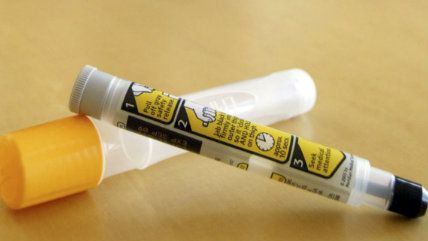EpiPen Not Overpriced, Despite New York Times Complaint
Contrary to what The New York Times claims, the outcry over EpiPen prices has made them lower.

"Outcry Over EpiPen Prices Hasn't Made Them Lower," is the misleading headline over Charles Duhigg's "Adventures in Capitalism" column in The New York Times business section. Duhigg writes, "I was surprised when my pharmacist informed me, months after those floggings and apologies had faded from the headlines, that I would still need to pay $609 for a box of two EpiPens."
That's the third paragraph of the story.
Twenty-six paragraphs later, way down toward the very end of the article, Duhigg discloses, "In fact, the company says that since it came under attack in August, nearly 90 percent of EpiPen buyers have paid less than $100 per box because of insurance, discounts or coupons."
So it sure looks as if, contrary to the headline, the outcry over EpiPen prices has made them lower.
I know something about this because I happen to have a family member who needs one of these things. This year, I was the one who went to the pharmacy to have the prescription filled. The price I paid out of pocket was less than it has been in years past and indeed, was less than $100 for the box of two.
So, at least in my personal experience, the Times headline is inaccurate.
An interesting question that the Times totally avoids is why Duhigg's health insurance is such that he has to pay $609 instead of the less than $100 that I paid.
Maybe he is rich enough—he speaks for companies like Bloomberg, Fairmont Hotels, and American Express via the Harry Walker Agency, and his book "The Power of Habit" spent "over 168 weeks" on The New York Times bestseller list—that he goes without health insurance, or has chosen a plan with a very high deductible, figuring he can effectively self-insure for all but catastrophic costs. Maybe he gets his health insurance from the New York Times Company, and that company is under such financial duress, or so poorly managed, that it provides even star New York Times employees such as Duhigg with worse health coverage for prescription medicine than the insurance I purchase myself for my family. Maybe it was early in the calendar year, and Duhigg hadn't yet met his deductible for this sort of thing.
Duhigg's column is 2,000 words long, but it somehow manages to avoid all of those questions.
Duhigg does attack EpiPen manufacturer Mylan, asserting that the company "flouts the norms of good corporate behavior." He complains that the EpiPen costs "so much," and calls for investors to oust the company's board.
Yet consider that for $609, or, for about 90% of people, less than $100 out of pocket, the company is offering a year's worth of access to potentially life-saving medicine, in a reliable delivery system. Compare that to the pricing of The New York Times: $1,014 for a yearlong seven-day-a-week home delivery subscription to a newspaper that, rather than saving your life, might inflict life-shortening stress.
Times defenders might argue that very few people actually pay the full $1014 annual rate. Most people pay less because they buy online-only subscriptions, or get it through work or at the library, or have student or faculty discounts, or get cheaper introductory rates. That's like Mylan arguing that most people pay less than $100 rather than the full $609.
I'm looking forward to the Charles Duhigg column complaining that The New York Times subscription pricing structure "flouts the norms of good corporate behavior," and calling for investors to replace members of the Times Company board of directors. But I suspect I'll be waiting a long time for that one. At the very least, a follow-up column explaining why the price he paid for the EpiPen is so much higher than what nearly 90 percent of other buyers paid would be in order. Otherwise, the "adventure in capitalism" here involves the Times itself ripping readers off for journalism that inaccurately portrays another company as rapacious.
Next time around, rather than joining the pile-on against Mylan, maybe the Times might consider exposing its readers to some unconventional thinking. At least one prominent health care industry consultant, David Williams, argues that even at $600, the EpiPen is underpriced. If the item were priced even higher, it would create more incentives for competitors to enter the market with alternatives. Competition, after all, is a good thing for customers, whether in the pharmaceutical business or the journalism business.


Show Comments (57)